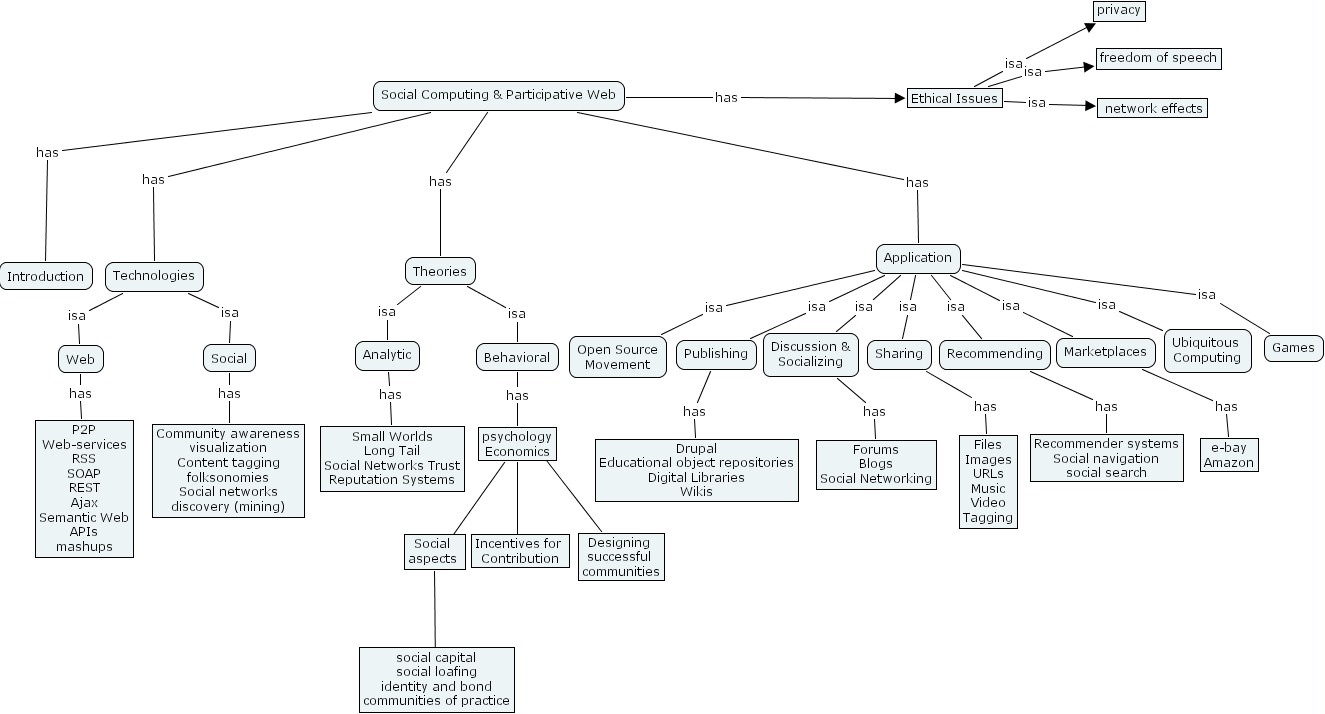INFSCI 3550: The Social Web
Doctoral Seminar, Systems
(Spring 2010, CRN 39539)
[ Formal Data | Syllabus | Tools| Wiki | CourseWeb ]
Syllabus
The new generation of web sites and applications, which is frequently called Social Web or Web 2.0, celebrate the power of the users. Different sources stress different aspects of the Social Web. Most frequently it is associated with the power of users as content contributors through Wikis, blogs, and resource sharing sites. Others look at the Social Web as a new linking and communication medium stressing various social linking sites such as LinkedIn, FaceBook, and SecondLife. In our own field, Information Science, a number or research groups worldwide explore social information access technologies, which help users get to the right information using “community wisdom” distilled from the actions of those who worked with this information earlier.
The goal of this Doctoral Seminar is to get immersed into the world of the Social Web and to form jointly a broad wholistic understanding of it. The attendees will learn about many aspects of the Social Web, get familiar with major Social Web technologies, and study many examples of modern Social Web systems. After the end of the seminar the students should be able to design their own Social Web systems as well as to apply Social Web technologies in the context of their own research.
Those who will successfully complete the seminar will have a chance to join a small cohort of experts on the modern Social Web. The Social Web industry is on the rise. In the coming 2-3 years universities, research labs, and companies will need hundreds of experts who understand Social Web technologies to lead various exciting projects. This is your chance to be among the leaders of this new and exciting field.
Topics
To show the list of topics, which we hope to cover during the course, we developed a small ontology of the Social Web. Click on the picture to enlarge it and to see more details. An updated list of topics is provided on the class Wiki.

After a brief introduction into the field provided by the instructor we will switch to a regular work mode. Every week we focus on one or two topics and will read and discuss several research papers related to it. Doctoral students, guest speakers, and the instructor will alternate in leading presentation for each of these topics. To complement the "reading part", the students will perform a range of weekly activities with several selected social Web systems. The practical part of the course include one small assigment and one large research or development project, which can be peformed individually or in groups.
Attendance (12pts)
- Your attendance at each class counts towards your grade. One point is given for attending one class. The score is capped on 12pts.
Weekly Coursework (6pts each week)
- Resource discovery, sharing, and tagging(3pts each week)
- After each class find 3 research papers related to either topics discussed in class. You can find papers anywhere - ACM DL, Google Scholar, IEEE Xplore, CiteULike, or BibSonomy itself, but for all three papers you should be the first one to post it to the Social Web group. Post it to BibSonomy system to the Social Web group (and your own account if you wish) and tag. One of the tags should be Lecture-X where X is the lecture number. Another tag should correspond to the lecture topic (see class Wiki).
- Find 2 research talks and post to CoMeT system. Try to find talks, which you could recommend to your fellow students and friends. Bookmark the talks using descriptive tags. Use contribution score to see the impact of your sharing. Those with highest contribution score will receive extra points.
- Find 2 cultural events and post to Eventur system. Share it with friends and groups. Try to maximize the impact of the information you shared.
- Posting has to be done before the next lecture
- Reading and reflection (3pts each week)
- Read 2 papers per week. Pick one paper out of 4-6 assigned papers (2-3 for each weekly topic). Pick another paper out of three papers found by you for that class (see Resource Discovery).
- Post critique, or an elaborated question on the assigned paper, which you picked up for reading in the class WordPress blog. Reply to earlier posts.
At least one post and one reply per week is reqiured for full grade (1pt per week)
- Post a bried summary of "your" paper to your personal WordPress blog (2pts per week)
- To be posted by Monday midnight to allow other students to read and react
Other Assignments (14pts)
- LinkedIn/CourseWeb Profile Assignment (4pts)
- Create your LinkeIn profile and join the course group. Provide information about you, which could help your classmates to know you and to consider you for group project. Initialize your CourseWeb profile providing your picture and links to LinkedIN, Blog, and other course-related accounts.
- CoMeT Assignment (8pts)
- Attend one CoMeT colloquium per month, preferably the one you posted yourself. Post a brief summary of the attended colloquium to your personal WordPress blog (2pts each)
- Eventur Assignment (2pts)
- Attend one Eventur cultural event (one over the whole course duration). Post a rating and feedback of the event to Eventur
Topic presentation (35pts)
- Read 3-5 overview-rich papers on the topic, prepare summaries and post to your personal WordPress blog
- Distill main topics, issues, problems, developments
- Prepare a structured PowerPoint presentation, deliver in class
- Edit a section of the class Wiki on this topic: a brief, but structured presentation with a short intro and a separate section for each critical topic, issue, or system
Final Project (55pts)
- A small individual research project
- A pair research or development project
- A group development project (consider leading a team of MS students)
Course Policies
Academic Integrity
You are expected to be fully aware of your responsibility to maintain a high quality of integrity in all of your work. All work must be your own, unless collaboration is specifically and explicitly permitted as in the course group project. Any unauthorized collaboration or copying will at minimum result in no credit for the affected assignment and may be subject to further action under the University Guidelines for Academic Integrity. You are expected to have read and understood these Guidelines. A document discussing these guidelines was included in your orientation materials.
Special Considerations
If you have a disability that requires special testing accommodations or other classroom modifications, please, notify both the instructor and Disability Resources and Services by the second week of the term. You may be asked to provide documentation of your disability to determine the appropriateness of accommodations. To notify Disability Resources and Services, call 64807890 (voice or TDD) to schedule and appointment. The office is located in the William Pitt Union, Room 216,
Copyright © 2010 Peter Brusilovsky
Background by http://www.axclipart.com/



